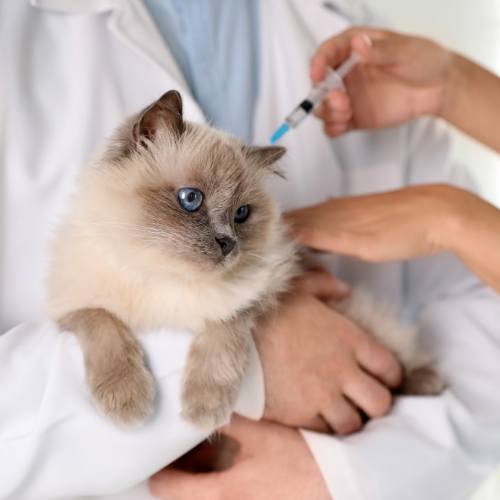Pet Vaccinations
At East Side Animal Hospital in Owensboro, KY, we believe preventive care is essential for keeping your pet healthy and happy.
Pet Vaccinations in Owensboro, KY
One of the most important aspects of preventive care is ensuring that your pet is up-to-date on their vaccinations.

Customized Vaccine Plans
Canine Vaccinations
- Distemper/Parvo: DA2PP is a combination vaccine for your dog that protects against four primary canine diseases — Distemper Virus, Adenovirus-2, Parainfluenza, and Parvovirus. Because these diseases can be deadly and do not have cures, regular vaccination is recommended to reduce your dog’s risk.
- Bordetella: Bordetella or kennel cough is a term loosely used to describe a complex of infections—both viral and bacterial—that causes inflammation of a dog’s voice box and windpipe. It’s a form of bronchitis and is similar to a chest cold in humans. Though it usually clears up on its own, kennel cough is highly contagious to other dogs.
- Leptospirosis: Leptospirosis (Lepto for short) is a serious bacterial disease that affects dogs, multiple animal species, and humans worldwide. In recent years, pet owners and veterinarians in the United States, especially in cities and suburbs, have become increasingly concerned about it.
- Rabies: Rabies is a severe and often fatal viral polio encephalitis that specifically affects the gray matter of the dog’s brain and its central nervous system (CNS). The primary way the rabies virus is transmitted to dogs in the United States is through a bite from a disease carrier: foxes, raccoons, skunks, and bats.
Feline Vaccinations
- Feline Distemper: The FVRCP vaccination is important to your cat’s routine. It prevents three potentially deadly airborne viruses: rhinotracheitis, calicivirus, and panleukopenia. These three viruses can be contracted by cats at any age. Kittens should receive their first FVRCP vaccination at 6 to 8 weeks, followed by three booster shots once a month. Adult cats should receive a booster once every year or two, according to Dr. Marsch’s recommendation. Adult cats with unknown vaccination records should receive an FVRCP vaccination plus a booster. Because FVRCP is a live vaccine, it should not be given to pregnant cats.
- Feline Leukemia: The feline leukemia virus is the leading cause of cancer in cats, but not all cats need to be vaccinated to be safe. The virus is contracted through contact with an infected cat, so if your other cats have not tested positive for the virus—and if they all stay indoors—there is no need to vaccinate a new kitten you bring into your home. However, if any of your cats will spend time outdoors, a vaccination may help protect them from the virus. And if your cat does test positive for the virus, you’ll need to take extra precautions to help them—and your other cats—stay as healthy as possible. For example, infected cats will be very susceptible to other diseases, such as upper respiratory infections, so you will need to monitor their health closely. You must keep them separate from other cats because the leukemia virus is highly contagious.
- Rabies: Rabies is a fatal viral disease that can infect all warm-blooded animals, including cats and humans. It affects the central nervous system and often first reveals itself through significant changes in a cat’s behavior, including sudden restlessness, aggression, and fear.
- A Word on Vaccine Reactions: PUREVAX®, the Boehringer Ingelheim line of feline vaccines, is developed with state-of-the-art technology just for cats and kittens. PUREVAX vaccines deliver everything needed to induce immunity without unnecessary proteins or adjuvants. Adjuvants are additives that increase the immune response and may present potential risks to feline patients, such as injection site reactions and chronic inflammation. PUREVAX is the only complete line of unadjuvanted feline vaccines available. Cats are exposed to many diseases during their lifetime. Some of these diseases may be caused by bacteria, viruses, or parasites. Your veterinarian will advise you of what diseases your cat may be at risk of contracting and which vaccine(s) is appropriate to ensure your pet’s good health.
Schedule Your Pet’s Vaccinations Today
Protect your pet against preventable diseases by scheduling their vaccinations at East Side Animal Hospital in Owensboro, KY. Our experienced veterinary team is here to provide compassionate care and support for your furry family member. Contact us today to schedule your pet’s vaccinations and ensure they stay healthy for years to come.
